Fleurs du Mal Magazine


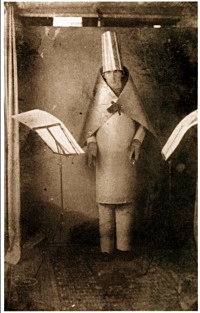
brulba dori
brulba dori daula dalla
sula lori wauga malla
lori damma fusmalu
Dasche mame came rilla
schursche saga moll vasvilla
suri pauge fuzmalu
Dolli gamba bokamufti
sabel ize spogagufti
palazuma polja gei
mula dampe dori villa
alles virds schavi drestilla
offi lima dozapau
pozadau
Hugo Ball
(1886-1927)
gedicht: brulba dori
fleursdumal.nl magazine
More in: Archive A-B, Ball, Hugo, DADA, Dada, Dadaïsme
In this second novel of Alison Weir’s epic Six Tudor Queens series, the acclaimed author and historian weaves exciting new research into the story of Anne Boleyn, Henry VIII’s most infamous wife, a woman ahead of her time whose very life—and death—forever changed a nation.
 Born into a noble English family, Anne is barely a teenager when she is sent from her family’s Hever Castle to serve at the royal court of the Netherlands. This strategic move on the part of her opportunistic father also becomes a chance for the girl to grow and discover herself. There, and later in France, Anne thrives, preferring to absorb the works of progressive writers rather than participate in courtly flirtations. She also begins to understand the inequalities and indignities suffered by her gender.
Born into a noble English family, Anne is barely a teenager when she is sent from her family’s Hever Castle to serve at the royal court of the Netherlands. This strategic move on the part of her opportunistic father also becomes a chance for the girl to grow and discover herself. There, and later in France, Anne thrives, preferring to absorb the works of progressive writers rather than participate in courtly flirtations. She also begins to understand the inequalities and indignities suffered by her gender.
Anne isn’t completely inured to the longings of the heart, but her powerful family has ambitious plans for her future that override any wishes of her own. When the King of England himself, Henry VIII, asks Anne to be his mistress, she spurns his advances—reminding him that he is a married man who has already conducted an affair with her sister, Mary. Anne’s rejection only intensifies Henry’s pursuit, but in the absence of a male heir—and given an aging Queen Katherine—the opportunity to elevate and protect the Boleyn family, and to exact vengeance on her envious detractors, is too tempting for Anne to resist, even as it proves to be her undoing.
While history tells of how Anne Boleyn died, this compelling new novel reveals how fully she lived.
“This is a stunning, engaging, comprehensive and convincing novel. . . . [Alison] Weir’s characterisation is superb, and this complex novel will be, without doubt, one of the most admired works of historical fiction of 2017.” – Historical Novels Review
Alison Weir is the New York Times bestselling author of numerous historical biographies, including The Lost Tudor Princess, Elizabeth of York, Mary Boleyn, The Lady in the Tower, Mistress of the Monarchy, Henry VIII, Eleanor of Aquitaine, The Life of Elizabeth I, and The Six Wives of Henry VIII, and the novels Anne Boleyn, A King’s Obsession; Katherine of Aragon, The True Queen; The Marriage Game; A Dangerous Inheritance; Captive Queen; The Lady Elizabeth; and Innocent Traitor. She lives in Surrey, England, with her husband.
Anne Boleyn, A King’s Obsession
A Novel
By Alison Weir
Part of Six Tudor Queens
Historical Fiction – Literary Fiction
Paperback
Publ. Penquin Random House
May 01, 2018
576 Pages
new books
fleursdumal.nl magazine
More in: - Book News, - Book Stories, Anne Boleyn, Archive W-X, Art & Literature News
Gathered together, the poems of Frank Bidart perform one of the most remarkable transmutations of the body into language in contemporary literature.
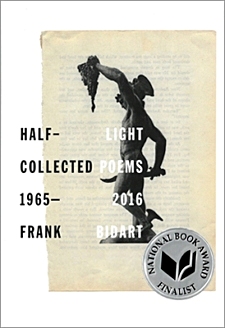 His pages represent the human voice in all its extreme registers, whether it’s that of the child murderer Herbert White, the obsessive anorexic Ellen West, the tormented genius Vaslav Nijinsky, or the poet’s own. And in that embodiment is a transgressive empathy, one that recognizes our wild appetites, the monsters, the misfits, the misunderstood among us, and inside of us.
His pages represent the human voice in all its extreme registers, whether it’s that of the child murderer Herbert White, the obsessive anorexic Ellen West, the tormented genius Vaslav Nijinsky, or the poet’s own. And in that embodiment is a transgressive empathy, one that recognizes our wild appetites, the monsters, the misfits, the misunderstood among us, and inside of us.
Few writers have so willingly ventured to the dark places of the human psyche, and allowed themselves to be stripped bare on the page with such candor and vulnerability. Over the past half century, Bidart has done nothing less than invent a poetics commensurate with the chaos and hunger of our experience.
Frank Bidart is the author of Metaphysical Dog, Watching the Spring Festival, Star Dust, Desire, and In the Western Night: Collected Poems 1965-90. He has won many prizes, including the Wallace Stevens Award, the 2007 Bollingen Prize for American Poetry, and the National Book Critics Circle Award. He teaches at Wellesley College and lives in Cambridge, Massachusetts.
Frank Bidart
Half-light:
Collected Poems 1965-2016
(Farrar, Straus and Giroux –
Macmillan Publishers)
ISBN: 9780374125950
Frank Bidart Wins 2017 National Book Award for Poetry
fleursdumal.nl magazine
More in: - Book News, - Bookstores, Archive A-B, Art & Literature News, Awards & Prizes
When Oliver Sacks was twelve years old, a perceptive schoolmaster wrote in his report: “Sacks will go far, if he does not go too far.”
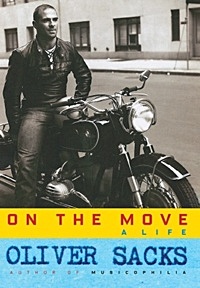 It is now abundantly clear that Sacks has never stopped going. From its opening pages on his youthful obsession with motorcycles and speed, On the Move is infused with his restless energy.
It is now abundantly clear that Sacks has never stopped going. From its opening pages on his youthful obsession with motorcycles and speed, On the Move is infused with his restless energy.
As he recounts his experiences as a young neurologist in the early 1960s, first in California, where he struggled with drug addiction, and then in New York, where he discovered a long-forgotten illness in the back wards of a chronic hospital, we see how his engagement with patients comes to define his life.
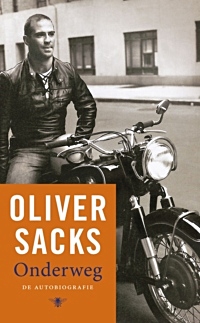 With unbridled honesty and humor, Sacks shows us that the same energy that drives his physical passions—weight lifting and swimming—also drives his cerebral passions.
With unbridled honesty and humor, Sacks shows us that the same energy that drives his physical passions—weight lifting and swimming—also drives his cerebral passions.
He writes about his love affairs, both romantic and intellectual; his guilt over leaving his family to come to America; his bond with his schizophrenic brother; and the writers and scientists—Thom Gunn, A. R. Luria, W. H. Auden, Gerald M. Edelman, Francis Crick—who influenced him.
On the Move is the story of a brilliantly unconventional physician and writer—and of the man who has illuminated the many ways that the brain makes us human.
English:
On The Move:
A Life
Author: Oliver Sacks
Publisher: Alfred A. Knopf
Published: 2015
ISBN-10: 0385352549
ISBN-13: 9780385352543
Format: Hardcover
In Dutch:
Oliver Sacks:
Onderweg
Nederlands
Uitg. De Bezige Bij
Vertaald door
Otto Biersma & Luud Dorresteijn
432 pagina’s
Verschijningsjaar 2016
ISBN10 9023499484
ISBN13 9789023499480
fleursdumal.nl magazine
More in: - Book News, - Bookstores, Archive S-T, DRUGS & DISEASE & MEDICINE & LITERATURE, Oliver Sacks
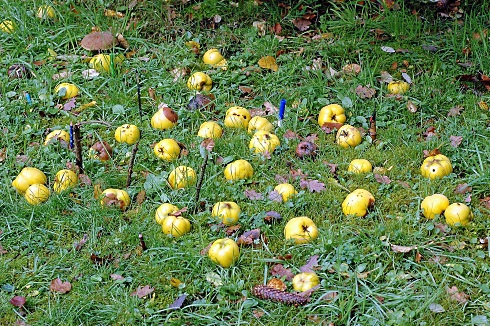
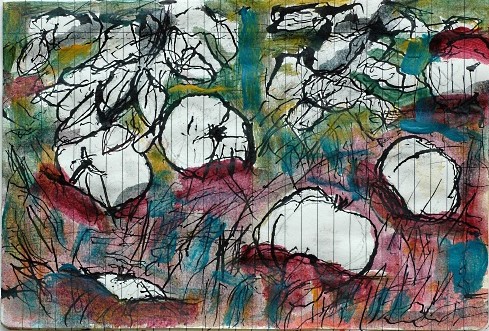
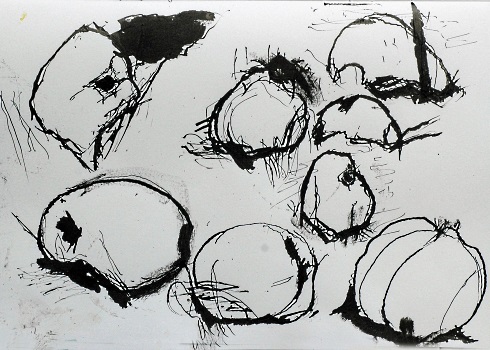
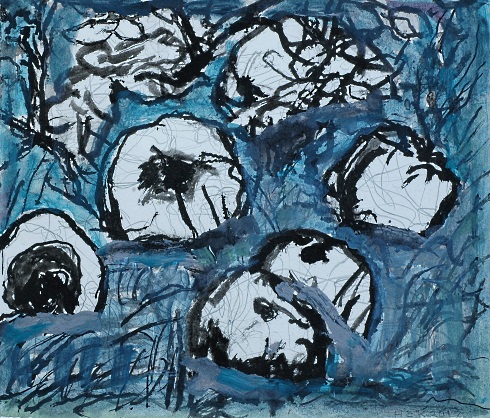
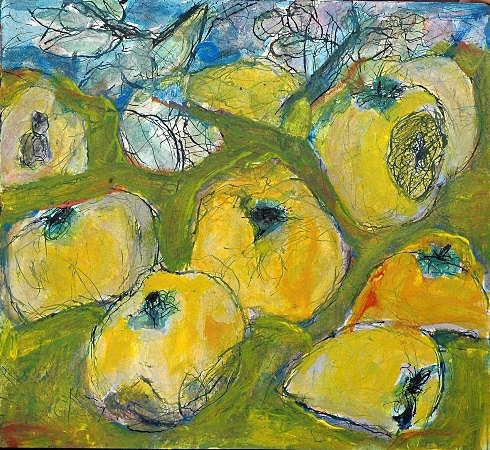
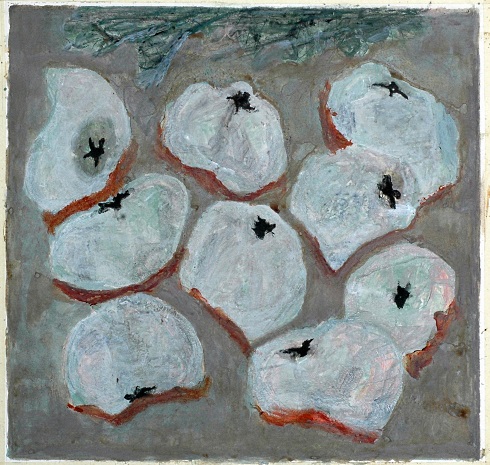
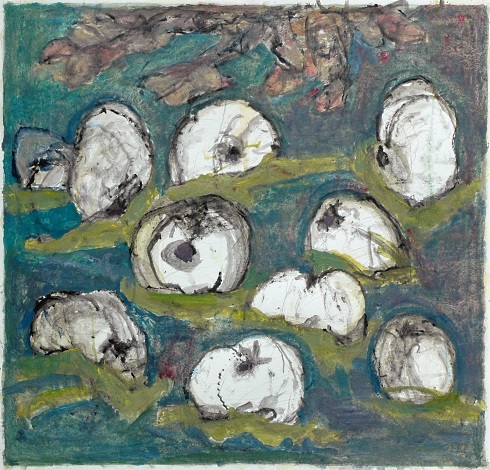
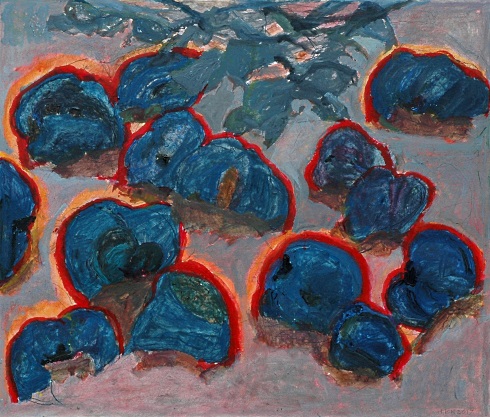
Hans Ebeling Koning:
Zoektocht naar illusies voorbij de werkelijkheid, 2017
Hans Ebeling Koning (1931) received his education at AKI in Enschede where he later became a teacher in drawing and painting. His work is represented in many public and private collections including Museum Henriette Polak in Zutphen, Rijksmuseum Twente and the Museum of Modern Art in Arnhem.
Hans Ebeling Koning ©
fleursdumal.nl magazine
More in: Art & Literature News, Exhibition Archive, FDM Art Gallery, Hans Ebeling Koning
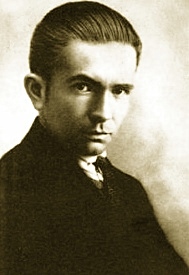
Marcel Schwob
Ik wil de wonderlijke wonden
van uw voeten zoenen, ik, de boetende,
en gij die reeds gekruisigd werd.
Ik weet ook gij
werd aan het kruis gekromd,
mijn stille kruistochtkind.
Gij zijt de stem van de Doper,
doch ik ben niet de Tetrarch.
Gij zijt het gans gebeuren.
U tegenover zal ik niet zondigen,
want uwe wonde ken ik,
zonder dat mijn hand hare kilte voelt.
Van uwe lippen wil ik de liefde drinken,
was ook uw lijf nog slechts een vreselijk offer,-
de melaatse kluizenaar in de woestijn.
Mijn handen zijn nog niet doorwond,
de koorden snijden enkel het vlees
van mijn arme armen.
Doch zeg slechts een woord, gekruisigde,
en de lichten in mij zullen zich omzetten
tot de kaarsen van het paradijs.
Paul van Ostaijen
(1896 – 1928)
Gedicht: Marcel Schwob
Marcel Schwob (1867 – 1905),
was a Jewish – French symbolist writer.
fleursdumal.nl magazine
More in: *Concrete + Visual Poetry K-O, Archive O-P, Marcel Schwob, Ostaijen, Paul van, Paul van Ostaijen, Paul van Ostaijen
 Schrijver en beeldend kunstenaar Jan Cremer (1940) stamt van vaderszijde uit een familie van hoefsmeden en beroepsmilitairen uit Pruisen en Hessen, zijn moeders familie is afkomstig uit Hongarije.
Schrijver en beeldend kunstenaar Jan Cremer (1940) stamt van vaderszijde uit een familie van hoefsmeden en beroepsmilitairen uit Pruisen en Hessen, zijn moeders familie is afkomstig uit Hongarije.
Korte tijd volgde hij een opleiding aan de Academie voor Beeldende Kunst in Arnhem. Als schilder kreeg hij snel erkenning met zijn ‘peinture barbarisme’, intussen reist hij de wereld rond.
In de donkere winterse dagen van 1959 ontmoeten een onbekende West-Friese verpleegster en een schilderende rebel elkaar in het Amsterdamse uitgaansleven. Het is liefde op het eerste gezicht, voor beiden meteen een lotsbestemming. Vijf jaar later zijn zij allebei beroemd.
Zij als Loesje Hamel (1938 – 1974), topmannequin bij Pierre Cardin en later de ster van het Shaffy Chantant. Hij als de schrijver van de onverbiddelijke bestseller.
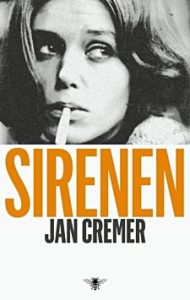 Wat begint als een verboden liefde wordt een hectische en onrustige odyssee die hen zo’n tien jaar lang telkens uit elkaar drijft naar beide kanten van de oceaan. Toch zoeken ze elkaar steeds op, maar het is pas na een halve eeuw dat Jan haar brieven durft te lezen en de confrontatie met zichzelf kan aangaan. Het inspireerde hem tot Sirenen, het relaas van hun dramatisch verlopen liefde.
Wat begint als een verboden liefde wordt een hectische en onrustige odyssee die hen zo’n tien jaar lang telkens uit elkaar drijft naar beide kanten van de oceaan. Toch zoeken ze elkaar steeds op, maar het is pas na een halve eeuw dat Jan haar brieven durft te lezen en de confrontatie met zichzelf kan aangaan. Het inspireerde hem tot Sirenen, het relaas van hun dramatisch verlopen liefde.
Ik heb misgegokt, was er te zeker van dat jij er altijd voor mij zou zijn.
Dat ik je dan met mijn motor op zou halen en dat jij in het zijspan zou springen en wij voorgoed verdwenen, zoals in een film.
Lieve Jan,
We konden allebei niet helpen
dat alles ging zoals het is gegaan.
Neem het geen van ons beiden kwalijk.
We deden ons best.
Ik hield echt van je, dat weet je toch?
Dag, veel liefs.
Loes
(April 1974)
Jan Cremer
Sirenen (Odyssee deel 2)
Non-fictie
Aantal pagina’s 304
Paperback – € 19,99
Nederlandstalig
Verschijningsdatum november 2017
Druk 1
ISBN10 9023443586
ISBN13 9789023443582
Uitgeverij De Bezige Bij
fleursdumal.nl magazine
More in: - Book News, - Book Stories, Archive C-D, Art & Literature News, Jan Cremer

C’est Lou Qu’on La Nommait
Il est des loups de toute sorte
Je connais le plus inhumain
Mon cœur que le diable l’emporte
Et qu’il le dépose à sa porte
N’est plus qu’un jouet dans sa main
Les loups jadis étaient fidèles
Comme sont les petits toutous
Et les soldats amants des belles
Galamment en souvenir d’elles
Ainsi que les loups étaient doux
Mais aujourd’hui les temps sont pires
Les loups sont tigres devenus
Et les Soldats et les Empires
Les Césars devenus Vampires
Sont aussi cruels que Vénus
J’en ai pris mon parti Rouveyre
Et monté sur mon grand cheval
Je vais bientôt partir en guerre
Sans pitié chaste et l’œil sévère
Comme ces guerriers qu’Epinal
Vendait Images populaires
Que Georgin gravait dans le bois
Où sont-ils ces beaux militaires
Soldats passés Où sont les guerres
Où sont les guerres d’autrefois
Guillaume Apollinaire
(1880 – 1918)
Poèmes à Lou
C’est Lou Qu’on La Nommait
fleursdumal.nl magazine
More in: Apollinaire, Guillaume, Archive A-B, Guillaume Apollinaire
Queer Shakespeare: Desire and Sexuality draws together 13 essays, which offer a major reassessment of the criticism of desire, body and sexuality in Shakespeare’s drama and poetry.
 Bringing together some of the most prominent critics working at the intersection of Shakespeare criticism and queer theory, this collection demonstrates the vibrancy of queer Shakespeare studies.
Bringing together some of the most prominent critics working at the intersection of Shakespeare criticism and queer theory, this collection demonstrates the vibrancy of queer Shakespeare studies.
Taken together, these essays explore embodiment, desire, sexuality and gender as key objects of analyses, producing concepts and ideas that draw critical energy from focused studies of time, language and nature.
The Afterword extends these inquiries by linking the Anthropocene and queer ecology with Shakespeare criticism.
Works from Shakespeare’s entire canon feature in essays which explore topics like glass, love, antitheatrical homophobia, size, narrative, sound, female same-sex desire and Petrarchism, weather, usury and sodomy, male femininity and male-to-female crossdressing, contagion, and antisocial procreation.
Queer Shakespeare
Desire and Sexuality
Editor(s): Goran Stanivukovic
Published: 13-07-2017
Format: Hardback
Edition: 1st
Extent: 424 pp
ISBN: 9781474295246
Imprint: The Arden Shakespeare
Dimensions: 198 x 129 mm
Bloomsbury Publishing
$144.00
Queer Shakespeare. Desire and Sexuality
fleursdumal.nl magazine
More in: - Book Lovers, - Book News, - Book Stories, Archive S-T, Archive S-T, Art & Literature News, AUDIO, CINEMA, RADIO & TV, LGBT+ (lhbt+), Shakespeare, William, THEATRE, TRAVESTY & POETRY
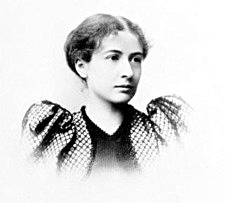
On The Train
I
The lady in front of me in the car,
With little red coils close over her ears,
Is talking with her friend;
And the circle of ostrich foam around her hat,
Curving over like a wave,
Trembles with her little windy words.
What she is saying, I wonder,
That her feathers should tremble
And the soft fur of her coat should slip down over her shoulders?
Has her string of pearls been stolen,
Or maybe her husband?
II
He is drunk, that man —
Drunk as a lord, a lord of the bibulous past. [sic]
He shouts wittily from his end of the car to the man in the corner;
He bows to me with chivalrous apologies.
He philosophizes, plays with the wisdom of the ages,
Flings off his rags,
Displays his naked soul —
Athletic, beautiful, grotesque.
In the good time coming,
When men drink no more,
Shall we ever see a nude soul dancing
Stript and free
In the temple of his god?
III
She comes smiling into the car
With irridescent bubbles of children.
She blooms in the close plush seats
Like a narcissus in a bowl of stones.
She croons to a baby in her lap —
The trees come swinging by to listen,
And the electric lights in the ceiling are stars.
Harriet Monroe poetry
(1860 – 1936)
On The Train
fleursdumal.nl magazine
More in: Archive M-N, Monroe, Harriet
Published for the first time in a beautiful collectible edition, the essential lecture delivered by the 2016 recipient of the Nobel Prize in Literature, Bob Dylan.
 On October 13, 2016, Bob Dylan was awarded the Nobel Prize in Literature, recognizing his countless contributions to music and letters over the last fifty years. Some months later, he delivered an acceptance lecture that is now memorialized in book form for generations to come.
On October 13, 2016, Bob Dylan was awarded the Nobel Prize in Literature, recognizing his countless contributions to music and letters over the last fifty years. Some months later, he delivered an acceptance lecture that is now memorialized in book form for generations to come.
In The Nobel Lecture, Dylan reflects on his life and experience with literature, providing both a rare artistic statement and an intimate look at a uniquely American icon.
From finding inspiration in the music of Buddy Holly and Leadbelly to the works of literature that helped shape his own approach to writing—The Odyssey, Moby-Dick, and All Quiet on the Western Front—this is Dylan like you’ve never seen him before.
Bob Dylan
The Nobel Lecture Hardcover
32 pages
Hardcover
October 31, 2017
Language: English
ISBN-10: 1501189409
ISBN-13: 978-1501189401
$10.73
Publisher: Simon & Schuster
fleursdumal.nl magazine
More in: - Book News, - Bookstores, Archive C-D, Art & Literature News, Awards & Prizes, Bob Dylan, Dylan, Bob
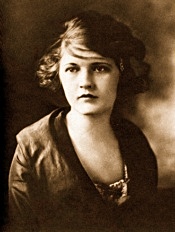 Regret
Regret
Mamzelle Aurelie possessed a good strong figure, ruddy cheeks, hair that was changing from brown to gray, and a determined eye. She wore a man’s hat about the farm, and an old blue army overcoat when it was cold, and sometimes top-boots.
Mamzelle Aurélie had never thought of marrying. She had never been in love. At the age of twenty she had received a proposal, which she had promptly declined, and at the age of fifty she had not yet lived to regret it.
So she was quite alone in the world, except for her dog Ponto, and the negroes who lived in her cabins and worked her crops, and the fowls, a few cows, a couple of mules, her gun (with which she shot chicken-hawks), and her religion.
One morning Mamzelle Aurélie stood upon her gallery, contemplating, with arms akimbo, a small band of very small children who, to all intents and purposes, might have fallen from the clouds, so unexpected and bewildering was their coming, and so unwelcome. They were the children of her nearest neighbor, Odile, who was not such a near neighbor, after all.
The young woman had appeared but five minutes before, accompanied by these four children. In her arms she carried little Élodie; she dragged Ti Nomme by an unwilling hand; while Marcéline and Marcélette followed with irresolute steps.
Her face was red and disfigured from tears and excitement. She had been summoned to a neighboring parish by the dangerous illness of her mother; her husband was away in Texas — it seemed to her a million miles away; and Valsin was waiting with the mule-cart to drive her to the station.
“It’s no question, Mamzelle Aurélie; you jus’ got to keep those youngsters fo’ me tell I come back. Dieu sait, I wouldn’ botha you with ’em if it was any otha way to do! Make ’em mine you, Mamzelle Aurélie; don’ spare ’em. Me, there, I’m half crazy between the chil’ren, an’ Léon not home, an’ maybe not even to fine po’ maman alive encore!” — a harrowing possibility which drove Odile to take a final hasty and convulsive leave of her disconsolate family.
She left them crowded into the narrow strip of shade on the porch of the long, low house; the white sunlight was beating in on the white old boards; some chickens were scratching in the grass at the foot of the steps, and one had boldly mounted, and was stepping heavily, solemnly, and aimlessly across the gallery. There was a pleasant odor of pinks in the air, and the sound of negroes’ laughter was coming across the flowering cotton-field.
Mamzelle Aurélie stood contemplating the children. She looked with a critical eye upon Marcéline, who had been left staggering beneath the weight of the chubby Élodie. She surveyed with the same calculating air Marcélette mingling her silent tears with the audible grief and rebellion of Ti Nomme. During those few contemplative moments she was collecting herself, determining upon a line of action which should be identical with a line of duty. She began by feeding them.
If Mamzelle Aurélie’s responsibilities might have begun and ended there, they could easily have been dismissed; for her larder was amply provided against an emergency of this nature. But little children are not little pigs: they require and demand attentions which were wholly unexpected by Mamzelle Aurélie, and which she was ill prepared to give.
She was, indeed, very inapt in her management of Odile’s children during the first few days. How could she know that Marcélette always wept when spoken to in a loud and commanding tone of voice? It was a peculiarity of Marcélette’s. She became acquainted with Ti Nomme’s passion for flowers only when he had plucked all the choicest gardenias and pinks for the apparent purpose of critically studying their botanical construction.
“‘T ain’t enough to tell ‘im, Mamzelle Aurélie,” Marcéline instructed her; “you got to tie ‘im in a chair. It’s w’at maman all time do w’en he’s bad: she tie ‘im in a chair.” The chair in which Mamzelle Aurélie tied Ti Nomme was roomy and comfortable, and he seized the opportunity to take a nap in it, the afternoon being warm.
At night, when she ordered them one and all to bed as she would have shooed the chickens into the hen-house, they stayed uncomprehending before her. What about the little white nightgowns that had to be taken from the pillow-slip in which they were brought over, and shaken by some strong hand till they snapped like ox-whips? What about the tub of water which had to be brought and set in the middle of the floor, in which the little tired, dusty, sun-browned feet had every one to be washed sweet and clean? And it made Marcéline and Marcélette laugh merrily — the idea that Mamzelle Aurélie should for a moment have believed that Ti Nomme could fall asleep without being told the story of Croque-mitaine or Loup-garou, or both; or that Élodie could fall asleep at all without being rocked and sung to.
“I tell you, Aunt Ruby,” Mamzelle Aurélie informed her cook in confidence; “me, I’d rather manage a dozen plantation’ than fo’ chil’ren. It’s terrassent! Bonté! don’t talk to me about chil’ren!”
“T ain’ ispected sich as you would know airy thing ’bout ’em, Mamzelle Aurélie. I see dat plainly yistiddy w’en I spy dat li’le chile playin’ wid yo’ baskit o’ keys. You don’ know dat makes chillun grow up hard-headed, to play wid keys? Des like it make ’em teeth hard to look in a lookin’-glass. Them’s the things you got to know in the raisin’ an’ manigement o’ chillun.”
Mamzelle Aurélie certainly did not pretend or aspire to such subtle and far-reaching knowledge on the subject as Aunt Ruby possessed, who had “raised five an’ buried six” in her day. She was glad enough to learn a few little mother-tricks to serve the moment’s need.
Ti Nomme’s sticky fingers compelled her to unearth white aprons that she had not worn for years, and she had to accustom herself to his moist kisses — the expressions of an affectionate and exuberant nature. She got down her sewing-basket, which she seldom used, from the top shelf of the armoire, and placed it within the ready and easy reach which torn slips and buttonless waists demanded. It took her some days to become accustomed to the laughing, the crying, the chattering that echoed through the house and around it all day long. And it was not the first or the second night that she could sleep comfortably with little Élodie’s hot, plump body pressed close against her, and the little one’s warm breath beating her cheek like the fanning of a bird’s wing.
But at the end of two weeks Mamzelle Aurélie had grown quite used to these things, and she no longer complained.
It was also at the end of two weeks that Mamzelle Aurélie, one evening, looking away toward the crib where the cattle were being fed, saw Valsin’s blue cart turning the bend of the road. Odile sat beside the mulatto, upright and alert. As they drew near, the young woman’s beaming face indicated that her home-coming was a happy one.
But this coming, unannounced and unexpected, threw Mamzelle Aurélie into a flutter that was almost agitation. The children had to be gathered. Where was Ti Nomme? Yonder in the shed, putting an edge on his knife at the grindstone. And Marcéline and Marcélette? Cutting and fashioning doll-rags in the corner of the gallery. As for Élodie, she was safe enough in Mamzelle Aurélie’s arms; and she had screamed with delight at sight of the familiar blue cart which was bringing her mother back to her.
The excitement was all over, and they were gone. How still it was when they were gone! Mamzelle Aurélie stood upon the gallery, looking and listening. She could no longer see the cart; the red sunset and the blue-gray twilight had together flung a purple mist across the fields and road that hid it from her view. She could no longer hear the wheezing and creaking of its wheels. But she could still faintly hear the shrill, glad voices of the children.
She turned into the house. There was much work awaiting her, for the children had left a sad disorder behind them; but she did not at once set about the task of righting it. Mamzelle Aurélie seated herself beside the table. She gave one slow glance through the room, into which the evening shadows were creeping and deepening around her solitary figure. She let her head fall down upon her bended arm, and began to cry. Oh, but she cried! Not softly, as women often do. She cried like a man, with sobs that seemed to tear her very soul. She did not notice Ponto licking her hand.
Kate Chopin (1850 – 1904)
Regret
fleursdumal.nl magazine
More in: Archive C-D, Chopin, Kate
Thank you for reading Fleurs du Mal - magazine for art & literature